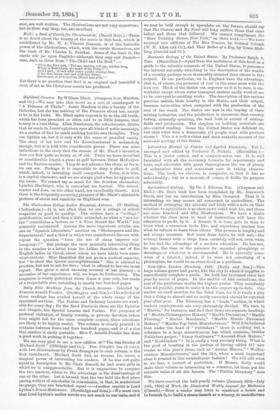flighlatad Cousins. By William Black. (Sampson Low, Marston, and Co.)—We
may take this novel as a sort of counterpart to " A Princess of Thule." Jessie Maclean is also a beauty of the Hebrides, but she has nothing of the Princess about her, except it be in her looks. Mr. Black again expounds to us the old truth, which has been preached so often and to so little purpose, that beauty is a vain thing. Allan Henderson, the schoolmaster, thinks that he reads in Jessie's glorious eyes all kinds of noble meanings. As a matter of fact he reads nothing but his own thoughts. They can lighten up, but it is only with the sense of gratified vanity. The story of his love and his disenchantment is melancholy enough, but it is told with considerable power. There are some indications in the story that the stream of Mr. Black's invention does not flow quite as freely as of old. Twice we have described at considerable length a game at golf between Peter MoFadyen and the Station-master. They do not advance the story, as far as we can see. Perhaps it is impossible to deny a place to golf, which, indeed, is intruding itself everywhere. Peter, it is true, is a capital character, and we are always glad when he appears on the scene. We cannot say as much for the drunken shoemaker, Lauchie 1/EacIntyre, who is somewhat too farcical. The school- master and Jess, on the other hand, are excellently drawn. And there is the frequently recurring pleasure of Mr. Black's admirable pictures of storm and sunshine on Highland seas.

































 Previous page
Previous page